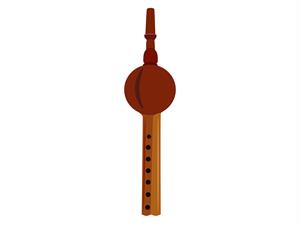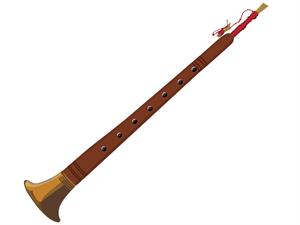PDF chapter test TRY NOW
Aurangzeb was a Mughal emperor who ruled India during the \(16\)th century. He had officially prohibited the musical instrument called "pungi" in his palace. He felt the pungi instrument had a piercing, sharp, unpleasant sound and it became the common name for all wind instruments which had reeds. (A reed is a thin strip of material that vibrates to produce a sound in a musical instrument). There was a barber who hailed from a family of professional musicians. This barber had access to the palace and he decided to improve the quality of sound from the pungi.

The instrument "pungi".
He took a pipe with a more hollow stem which was longer and broader than the existing pungi. He made seven holes on the body of the instrument. He opened and closed some of the holes while playing it. The shrill noise was transformed into soft and melodious tunes. He impressed everyone with this new sound. The transformed new instrument could not be called with the same name "pungi" anymore. A new name had to be coined for the same. It is believed that it was named "Shehnai" - because it was first played in the "Shah's" chambers by a nai (barber in Hindi).

The instrument "shehnai".
The sound of the shehnai was liked by all and was considered auspicious, or promising to bring good fortune. It is played in all temples till today because it is considered auspicious. There cannot be any North Indian weddings without shehnai music as it has become absolutely necessary. During the olden times, shehnai was a part of the group of nine instruments in the palace, called the naubat. From temples and weddings, shehnai has reached the classical music stage - only because of Ustad Bismillah Khan.
As a five-year-old, he used to play gillidanda, a traditional Indian game near a pond in Dumraon, Bihar. He also went to the Bihariji temple near the pond regularly and sang the Bhojpuri Chaita, a collection of classical songs. He received a prize from the local king of the Dumraon estate for the same. The prize was a big laddu (Indian ball-shaped sweet) weighing \(1.25\ \)kgs. This incident happened eighty years ago. From earning laddus for song recitals, Bismillah reached all the way till he obtained the Bharat Ratna, the highest civilian award in India.
Bismillah Khan was born on \(21\)st March \(1916\). He belongs to a family of famous musicians from Bihar. He hails from a family of shehnai players. His grandfather, Rasool Bux Khan, was the Shehnai-Nawaz of the Bhojpur palace. His father Paigambar Bux and other ancestors of his father's side were great shehnai musicians.
Bismillah Khan started training in music as a habit in his early years. When he was three years old, his mother took him to his maternal (related to the mother's side) uncle Ali Bux's house in Varanasi. Ali Bux used to practise the shehnai every day and Bismillah was attracted to this. Soon he joined his uncle's practice. Ali Bux was the official shehnai player of the Vishnu temple in Varanasi. Ali would play the shehnai and Bismillah would be charmed by the music that he held on to it for hours together. Gradually, he started learning from his uncle and he also started practising throughout the day. He practised in the Balaji temple, Mangala Maiya and on the banks of the Ganga river. These spots became a place frequented by Bismillah as he loved the lonely, uninhabited calmness best suited to his practice. He continued this for many years. The river Ganga flowing in all its glory proved to be an inspiration for him. He felt stimulated to improvise the existing ragas and invent new raagas that were not considered possible to be played in the shehnai instrument.
When Bismillah reached the age of \(14\), he went with his uncle to the Allahabad Music Conference. After the performance, Hindustani music expert Ustad Faiyaz Khan appreciated the young boy. He patted Bismillah's back and motivated him to work hard so that he will make it big in the music industry. The All India Radio service opened in Lucknow in \(1938\). It was Bismillah's big chance to prove his skills. Soon, Bismillah's shehnai music was heard often on the radio, because he got many chances to perform for the radio.
Bismillah's radio performances continued. After India's independence on \(15th\) August \(1947\), he was the first Indian to play the shehnai and greet the country. He played the Raag Kafi and he brought out all his deepest emotions in the performance. He played from the Red Fort. Mahatma Gandhi and Pandit Jawaharlal Nehru were prominent among those who heard his performance that day. It was after Bismillah's performance, that Pandit Jawaharlal Nehru gave his famous speech, 'Tryst with Destiny'.
Bismillah Khan gave many unforgettable performances, both within and outside the country. His first abroad trip was to Afghanistan. The performance was a huge success that the King of Afghanistan Zahir Shah, was so absorbed by his distinguished talent. The King gifted him precious Persian carpets and other mementoes as a token of appreciation. The King was not the only one fascinated by his skilled music.
Film director Vijay Bhatt had listened to Bismillah play at a music festival. Vijay Bhatt was so impressed that he made a film, for the shehnai instrument - called "Gunj Uthi Shehnai", meaning 'The Wedding Bells (shehnai sound) Have Started Ringing'. The film was a big hit and it featured Bismillah's composition "Dil ka khilona hai toot gaya ...”, meaning "heart is broken...". This song was a huge record-breaker. Bismillah went on to do another film with Director Vikram Srinivas - "Sanadhi Apanna", meaning Shehnai Apanna, the films dealt with the life of a rural shehnai artiste Apanna. This film was a roaring success too. However, even though Bismillah had such huge success in the film industry, he did not continue. He did not like the artificiality and the glamour of the film world.
Bismillah Khan received awards and recognition at a rapid rate with growing numbers. He was known internationally. He was given the following National Awards.
- Padmashri award
- Padma Bhushan award
- Padma Vibhushan award
Other prominent recognitions were:
- He was the first Indian to perform at the prestigious Lincoln Centre Hall in the USA.
- He participated in the World Exposition in Montreal.
- He participated in the Cannes Art Festival.
- He participated in the Osaka Trade Fair.
- An auditorium in Teheran was named after him, Tahar Mosiquee Ustaad Bismillah Khan.
Ustad Bismillah Khan received the nation's highest civilian award, the much desired Bharat Ratna in \(2001\). He held the award on his chest and his eyes were flashing with happiness, which was not a sight one can often see. He advised people to teach their children music, music being India's most important and valued tradition; he also said that Westerners were coming to India to learn our music.
It was seen that Bismillah travelled far and wide. But he was extremely fond of Benares and Dumraon - where he grew up and learnt the shehnai. It remains the most wonderful towns in the world, for Bismillah. Bismillah Khan was fondly known as "Khansaab" by the people around him.
Bismillah's student wanted him to be in charge of a shehnai school in the USA. The student promised Bismillah that he could recreate the atmosphere and surroundings of Benares. He even said he would replicate the temples there. But Khansaab asked him if he would be able to transport the River Ganga to the USA. He is believed to have said that whenever he is in a foreign country, he keeps longing to see his motherland. Even when in India, if he was in Mumbai, he thought of Benares and River Ganga, and if he was in Benares, he missed the unique Dumraon mattha where he grew up practising his shehnai.
The life of Bismillah Khan is a great example of the rich, diverse, cultural heritage of India. Even though Bismillah was a strict follower of Islam, he easily played the shehnai every morning in the Kashi Vishwanath temple. His music was beyond religious barriers. Such is the unity in diversity of our country.
